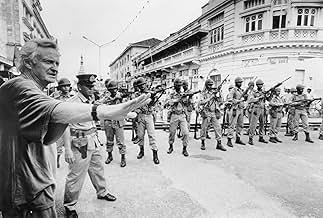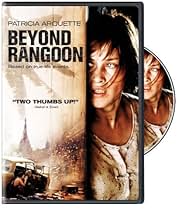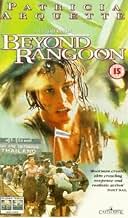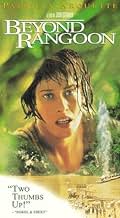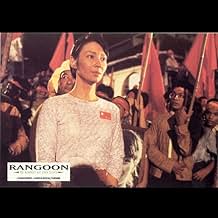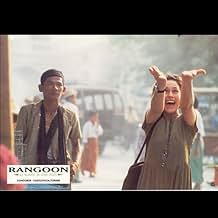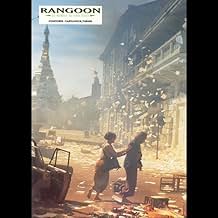IMDb RATING
6.5/10
5.6K
YOUR RATING
An American tourist finds herself in the middle of a political uprising in Burma.An American tourist finds herself in the middle of a political uprising in Burma.An American tourist finds herself in the middle of a political uprising in Burma.
- Director
- Writers
- Stars
- Awards
- 2 wins & 3 nominations total
Kuswadinata
- Colonel at Hotel
- (as Kuswadinath Bujang)
- Director
- Writers
- All cast & crew
- Production, box office & more at IMDbPro
Featured reviews
10amolad
This is one of the most underrated movies of the 1990s. If you allow yourself to identify with the Patricia Arquette character, you will find it to be a very moving story of a woman regaining a sense of purpose to her life, and finding a new will to live.
Arquette's performance is brave because it is purposefully "wooden" -- it's a way of defining her character's spiritual death, her complete lack of a desire to be alive. She moves through life like a zombie because her family has been murdered and she can't see the point of living. What is moving is how in the course of the story, she is reawakened -- by the Burmese landscape, by the beautiful quality of its people and landscapes, and by the primal choices she is forced to confront.
Boorman supports this visually (and Hans Zimmer supports it with one of his most gorgeous, haunting scores) with an often static camera and with a propensity to shoot through glass, windows, windshields, etc. We are on the outside looking in, just like Arquette.... until she finds herself deep in the jungle and is forced to choose whether or not to fight for her life.
I recommend the 1954 movie THE PURPLE PLAIN as well. It's a similar story in a similar setting, and makes for a fascinating comparison.
Arquette's performance is brave because it is purposefully "wooden" -- it's a way of defining her character's spiritual death, her complete lack of a desire to be alive. She moves through life like a zombie because her family has been murdered and she can't see the point of living. What is moving is how in the course of the story, she is reawakened -- by the Burmese landscape, by the beautiful quality of its people and landscapes, and by the primal choices she is forced to confront.
Boorman supports this visually (and Hans Zimmer supports it with one of his most gorgeous, haunting scores) with an often static camera and with a propensity to shoot through glass, windows, windshields, etc. We are on the outside looking in, just like Arquette.... until she finds herself deep in the jungle and is forced to choose whether or not to fight for her life.
I recommend the 1954 movie THE PURPLE PLAIN as well. It's a similar story in a similar setting, and makes for a fascinating comparison.
Patricia Arquette plays American doctor Laura Bowman, who takes a holiday to Burma in an attempt to heal her spirit after the murders of her husband and young son. She is left behind in Rangoon during a military crackdown and leaves the city with an aging man who works as a "tour guide." But he is no simple tour guide; he is a professor who introduces her to the life outside of the tourist traps ... the two of them get caught up in the political upheaval and Laura sees with her own eyes how the government betrays and oppresses its own people.
This movie is one of my favorites because of its themes. First, it's informational (describing some of the injustices that are occurring in Burma). Secondly, it's about a woman's struggle to find meaning in life after an incredible loss. Thirdly, it's about compassion and sacrifice, and people coming together - without even knowing each other - to endure pain and fear.
Just about every beautiful scene in this movie is important; nothing is wasted here. It's an earnest and moving film. There is also a very emotional score composed by Hans Zimmer which complements scenes nicely.
A definite recommend, especially to people concerned with human rights ... and people who want to know, "What purpose can I serve?"
This movie is one of my favorites because of its themes. First, it's informational (describing some of the injustices that are occurring in Burma). Secondly, it's about a woman's struggle to find meaning in life after an incredible loss. Thirdly, it's about compassion and sacrifice, and people coming together - without even knowing each other - to endure pain and fear.
Just about every beautiful scene in this movie is important; nothing is wasted here. It's an earnest and moving film. There is also a very emotional score composed by Hans Zimmer which complements scenes nicely.
A definite recommend, especially to people concerned with human rights ... and people who want to know, "What purpose can I serve?"
"The trip was Andy's idea. It was easier to say 'Yes' than argue. Always that way with my sister. She meant well. A touch of the exotic east would take me away from everything that reminded me of what had happened..."
So begins the film "Beyond Rangoon", about an emotionally troubled American who is urged by her sister to take a vacation in Rangoon, Burma to try and get over the devastating loss of her husband and child. While there, she becomes entertwined in very real political upheavel. The film depicts the marches and rallies and protests realistically, and shows massacres that are hard to watch, but need to be heard. The political upheavals that really happened in Burma in 1988 were never heard or talked about in the US, and needed to be. Aung San Su Kyi was a woman who was trying to bring Burma (Now Myanmar) to democracy, but was denied by the government. She still tried to lead her people to freedom, and the struggle still exists today. The film has powerful writing, directing, cinematography and acting. The absolutely chilling and powerful score by Hans Zimmer lends riveting power to each scene, and fills triumphant moments with triumph. Patricia Arquette portrays the American, Laura Bowman, with depth, very frozen by the horrors of her loss, "I tried finding something in those stone statues, but nothing stirred in me. I was stone myself", but slowly she sees the meaning of her life and others in her journeys throughout Rangoon and beyond. A terrific film. And it needs to be watched. At home, and in history or government classes. **** stars.
So begins the film "Beyond Rangoon", about an emotionally troubled American who is urged by her sister to take a vacation in Rangoon, Burma to try and get over the devastating loss of her husband and child. While there, she becomes entertwined in very real political upheavel. The film depicts the marches and rallies and protests realistically, and shows massacres that are hard to watch, but need to be heard. The political upheavals that really happened in Burma in 1988 were never heard or talked about in the US, and needed to be. Aung San Su Kyi was a woman who was trying to bring Burma (Now Myanmar) to democracy, but was denied by the government. She still tried to lead her people to freedom, and the struggle still exists today. The film has powerful writing, directing, cinematography and acting. The absolutely chilling and powerful score by Hans Zimmer lends riveting power to each scene, and fills triumphant moments with triumph. Patricia Arquette portrays the American, Laura Bowman, with depth, very frozen by the horrors of her loss, "I tried finding something in those stone statues, but nothing stirred in me. I was stone myself", but slowly she sees the meaning of her life and others in her journeys throughout Rangoon and beyond. A terrific film. And it needs to be watched. At home, and in history or government classes. **** stars.
When an American tourist comes to Burma with her sister to try and move on from the murder of her husband and son. However a midnight walk brings her into the middle of a student demonstration where she loses her passport. Left behind by her tour group she begins tour of discovery through the troubled country led by U Aung Ko. She discovers a world of atrocities that have not been exposed to the media.
There's no denying that there is a great story here it is a powerful tale of injustice, military rule and massacres that happened away from the public eye. However this film does not really tell that story. Instead it focuses on an American doctor on holiday in Burma who allows us to see all these things. However it comes across like it's about her rather than the country. She is seen as the most important character and we have a subplot about her overcoming the loss of her family in the US. It takes away from the central story and makes this feel like a soap.
Of course it needn't have been like that. It's only a terrible, flat, lifeless performance from Arquette that does this. She is so flat that it's hard to care about her and it comes across even more like a soap. She gives us shock, self-righteous indignation etc all under a monotone voice over than made me want to sleep. She manages to come across as more important than everyone else in the country and it's as she only sees events in terms of how they affect her. Outside of Arquette the support cast are good U Aung Ko in particular, but McDormand and Grey are OK.
The film continues with Hans Zimmer's standard `Far East' score (compare this to Black Rain to see what I mean) and Arquette discovering herself and spuing philosophy everywhere. However at the end the film acts as a metaphor for why the US didn't know about events in Burma because no one cares about massive deaths unless a Westerner is involved. We see in on the news everyday hundreds killed in a third world country is relegated to the end of the news, after a story about what Brittany was wearing that day! But if one American was killed then it would be the lead story with politicians running from all corners to comment on it.
The film manages to take a terrible, emotive story and make it into a beautifully shot drama about one American woman who only sees things in terms of how they affect her. Boorman has a good try but really needed a much better actress to lift the script.
There's no denying that there is a great story here it is a powerful tale of injustice, military rule and massacres that happened away from the public eye. However this film does not really tell that story. Instead it focuses on an American doctor on holiday in Burma who allows us to see all these things. However it comes across like it's about her rather than the country. She is seen as the most important character and we have a subplot about her overcoming the loss of her family in the US. It takes away from the central story and makes this feel like a soap.
Of course it needn't have been like that. It's only a terrible, flat, lifeless performance from Arquette that does this. She is so flat that it's hard to care about her and it comes across even more like a soap. She gives us shock, self-righteous indignation etc all under a monotone voice over than made me want to sleep. She manages to come across as more important than everyone else in the country and it's as she only sees events in terms of how they affect her. Outside of Arquette the support cast are good U Aung Ko in particular, but McDormand and Grey are OK.
The film continues with Hans Zimmer's standard `Far East' score (compare this to Black Rain to see what I mean) and Arquette discovering herself and spuing philosophy everywhere. However at the end the film acts as a metaphor for why the US didn't know about events in Burma because no one cares about massive deaths unless a Westerner is involved. We see in on the news everyday hundreds killed in a third world country is relegated to the end of the news, after a story about what Brittany was wearing that day! But if one American was killed then it would be the lead story with politicians running from all corners to comment on it.
The film manages to take a terrible, emotive story and make it into a beautifully shot drama about one American woman who only sees things in terms of how they affect her. Boorman has a good try but really needed a much better actress to lift the script.
10Tigre-2
Never had I seen such a powerful true story movie. I discovered a city, a country, a lost revolution and even a Nobel prize winner thanks to this masterpiece of cinema.
If you haven't seen this movie, you can't say you've seen anything .
A great lesson of courage, humility and life.
I haven't seen anything as good since.
T.E. Saturday, January 9th, 1999
If you haven't seen this movie, you can't say you've seen anything .
A great lesson of courage, humility and life.
I haven't seen anything as good since.
T.E. Saturday, January 9th, 1999
Did you know
- TriviaSpalding Gray had previously been in another film about a South East Asian conflict: "The Killing Fields" (1984), which documented the genocide from the Khmer Rouge in Cambodia.
- GoofsWhen Patricia Arquette arrives at the railroad station, a train is standing on the track nearest the platform. When she runs to get on the train, it is just pulling in to the station.
- How long is Beyond Rangoon?Powered by Alexa
Details
Box office
- Budget
- $23,000,000 (estimated)
- Gross US & Canada
- $5,750,110
- Opening weekend US & Canada
- $2,007,527
- Aug 27, 1995
- Gross worldwide
- $5,750,110
- Runtime
- 1h 40m(100 min)
- Color
- Sound mix
- Aspect ratio
- 2.39 : 1
Contribute to this page
Suggest an edit or add missing content


